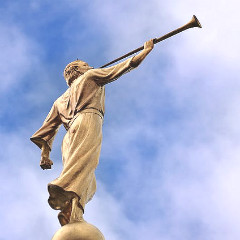For the last generation Mormons have tried to mainstream themselves. The popular “I am a Mormon” ad campaign is part of that effort, but it’s only the most recent manifestation of a long public-relations campaign. For the last few decades the Mormon Church has presented its adherents as good-neighborly types: friendly, moral, familial. But the family-down-the-street strategy is only part of the job.
The Mormons have also actively worked to make their beliefs appear within the pale of orthodox Christianity too. If you go to the Mormon.org site, for instance, you’ll be greeted by the affirmation, “We believe first and foremost that Jesus Christ is the Savior of the world and the Son of God,” a statement that any Christian group could affirm. So Mormons must be just like any Christian group, right?
Mitt Romney’s presidential bid has brought renewed attention to the question, and it’s disheartening to watch the way some Christians have answered it. Joel Osteen, for one egregious and recent example, told the Washington Times that “[Mormons] are Christians.” He elaborated, “I hear Mitt Romney . . . say, ‘I believe Jesus is the son of God,’ ‘I believe he’s my savior,’ and that’s one of the core issues.” He then downplayed the doctrinal problems. “I’m sure there are other issues that we don’t agree on,” he said. “But you know, I can say that the Baptists and the Methodists and the Catholics don’t all agree on everything.”
Baptists, Methodists, and Catholics disagree about things like bishops and whether babies should be baptized. Let’s compare that level of disagreement with the divide that separates Christians and Mormons. Take the first section of the Nicene Creed, a bedrock statement of accepted Christian teaching:
I believe in one God, the Father Almighty, Maker of heaven and earth, and of all things visible and invisible.
We’re already off to a rough start. If God is the maker of all things, he cannot have been made himself, yet Mormons teach exactly that: God the Father was once a man, just like you or me (Brigham Young, Journal of Discourses 7.334). And he still has a physical body; as it says in Doctrine and Covenants, “The Father has a body of flesh and bones as tangible as man’s” (130.22).
Now look at the next few lines from the creed, these concerning Christ:
And [I believe] in one Lord, Jesus Christ, the Son of God, the Only-begotten, begotten of the Father before all worlds, light of light, very God of very God, begotten not made, of one essence with the Father, by whom all things were made: Who for us men and for our salvation came down from heaven, and was incarnate of the Holy Spirit and the Virgin Mary, and became man. . . .
Where to begin? For Mormons Jesus isn’t the only son of God, and he’s not eternally begotten of the Father. God has many children, none of whom are eternally begotten because they were created in time. For Mormons Jesus was conceived, not when the Holy Spirit overshadowed Mary, as the King James delicately puts it, but when God the Father had intercourse with Mary. Remember, he’s got a “body of flesh and bones as tangible as a man’s.” That doesn’t sound like any Baptist, Methodist, or Catholic I know. Oh, yeah — because it’s not Christian.
Nonetheless, there is tremendous pressure in the culture to accept Mormons as Christians. And despite these radically different views, some Christians seem willing to accept them in the fold. Mormons, after all, are so clean-cut and all-American. Conservatives like it because Mormons make good co-belligerents in the culture wars. Who gives a rip about theology, anyway? The always-agreeable Joel Osteen caved in two shakes.
Perhaps the most ironic thing about our baptism of Mormonism is that the movement’s founder, Joseph Smith, along with all the early Mormons, would have despised it. To them, mainstream Christianity was apostate; this is the raison d’être of the whole movement. Mormons teach that the church fell into darkness shortly after Christ’s ascension and was only restored through the person and actions of Joseph Smith, some eighteen hundred years later. The only true Christians in this view are Mormons. For modern-day Mormons to seek inclusion among all the other supposedly apostate churches of Christendom is a bit like a pure-bred hound trying to hang out with the mutts and alley cats.
Whatever their motivation for inclusion, until Mormons reject their foundational doctrines about God and Christ (and a lot more) and accept the classic, creedal definitions of the faith, they have no business calling themselves Christians. And Christians have no business doing it either.













